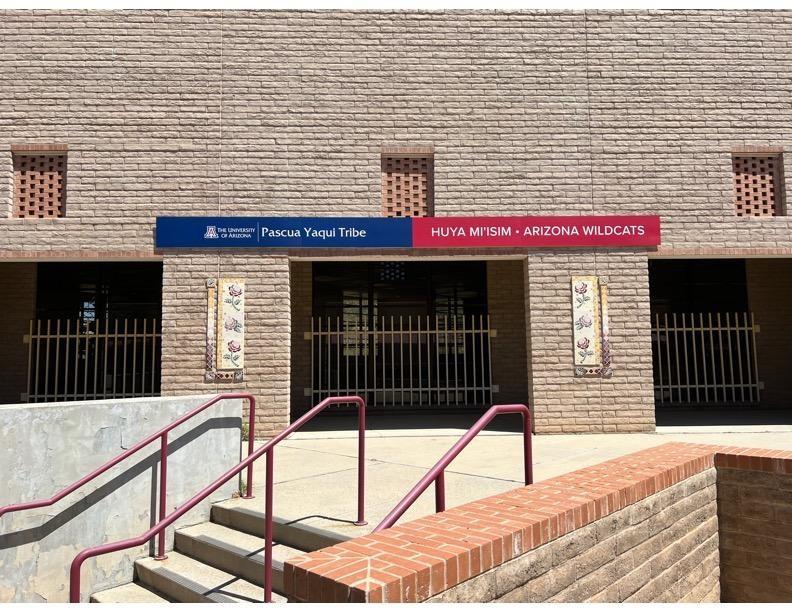The University of Arizona held a grand opening Sept. 7 for its first microcampus near tribal land. According to UA News, courses will begin later this fall, giving Pascua Yaqui students easy access to the university’s resources and degree programs.
Initially, the curriculum will include the Indigenous Governance Program’s Masters of Professional Studies Degree through the College of Law, as well as the Native Nations Institute’s Continuing Education Certificate in Indigenous Governance. There are plans to expand offerings in the future, including the Bachelor of Arts in the law program.
Courses will be offered in in-person, hybrid and online modalities, with flexible schedules to best suit the needs of students.
The campus is located next to the tribal reservation, at 7400 S. Settler Ave., the site of the former Hohokam Middle School, which was closed by the Tucson Unified School District in 2012. Within the 5,000-square-foot campus, students can find a classroom capable of accommodating 50 students, study rooms and a computer lab with access to university Wi-Fi.
Robert A. Williams is a regents’ professor of law and faculty co-chair of the Indigenous Peoples Law and Policy Program. He has helped lead the initiative and will teach courses at the microcampus.
The microcampus project has been in the works for three years, Williams explained. In 2019, the University of Arizona’s President Dr. Robert C. Robbins began to meet with the Pascua Yaqui on their reservation to ask how the university could best serve the tribe, leading to the idea of the microcampus.
“The [University of Arizona] has microcampuses all over the world in sovereign nations, so why not have a campus for the sovereign Pascua Yaqui tribe?” Williams said.
The project is also part of the university’s strategic plan to assist Native American communities. In 2019, an intergovernmental agreement was signed between the tribe and the university, which included plans for the microcampus. The agreement was negotiated by lawyers from both parties.
“These types of arrangements are unprecedented,” Williams said. “This is, as far as we know, the first tribal microcampus established on or near a reservation by a major Research 1, top-100 university.”
Williams explained that the courses will be in compressed formats and often held at night to accommodate students that work during the day.
“The idea is to fit what we’re doing out there to the needs of the community,” he said.
Williams described the microcampus as a fulfillment of Robbins’ goals, as well as an integral part of the university’s mission as a land-grant institution.
“The goal is very clear,” Williams said. “It’s to get more Yaqui students with degrees [and] successfully through college.”
Serina Preciado, the director of education for the Pascua Yaqui tribe, explained that the microcampus’ main function is to improve student retention.
“Most of our students, first of all, Yaqui higher education students are nontraditional students,” Preciado said. “They either skew a little bit older, or they’re part-time or evening students, and so the microcampus being basically right on the border of the reservation increases the likelihood and opportunity for those nontraditional Yaqui students to be able to make time to be on campus.”
The campus is tailored deliberately to the needs of the Pascua Yaqui and their workforce by giving students access to higher education programs that can benefit their community long-term.
“Our tribal workforce continues to grow year after year, but the number of students that we have in higher education is pretty stagnant,” she said. “That means that we face a lot of workforce issues that tribal members are not necessarily ready to address.”
“It’s also just generally about up-skilling our workforce, ensuring that they have access and opportunity to be able to take coursework right here in our backyard in a time and place that’s convenient for them,” Preciado added.
Preciado also said that the relationship between the tribe and the university has been positive and productive, leading to a number of joint educational efforts.
“Universities, sometimes you hear about them being land-grabbing institutions, and I think that for the University of Arizona this is one of the ways in which they counter that narrative by bringing those resources directly to the reservation to support our community members,” Preciado said.
The microcampus will be growing in the future to support the needs of the Pascua Yaqui tribe. They’re planning to expand coursework based on feedback from tribal members.
“It was a three-year paperwork process, and it’ll be a lifetime of implementation,” Preciado said.
Follow Erika Howlett on Twitter









